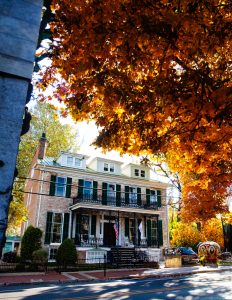
Photo by Monica Baranko
Winchester has a rich history that predates the Revolutionary War and extends through the Civil War and beyond. While historic symbols and architecture remain, others believe spirits also keep us company. Walking around old town, one can almost envision the men and women who once strolled the streets stopping by to observe what has changed. Would they be able to identify the town?
Loudoun Street, formerly Main Street, was important long before Winchester was created. It was known as the Wilderness Road, the Great Warriors Road, and eventually the Great Philadelphia Wagon Road when families began to migrate to locations south and west as the Colonies were created and expanded. Over 50 million people now can trace their ancestors back to someone who traversed our Old Town walking mall. It stands to reason that some people never wanted to leave.
7 Foot Tall Indians
Historians have proposed two possible explanations for the name of Indian Alley which runs parallel to Loudoun St. The first is a basic historical fact: when the town was created, the alley was where stables and animals were kept. Indigenous Indian tribes trading with early settlers would have stayed with their horses when traveling overnight, giving rise to the name Indian Alley. Long before that, Swiss explorer Louis Michelle reported 7-foot-tall Indians in 1707, which George Washington confirmed when remains were discovered during the construction of Fort Loudoun. Sightings of ethereal 7-foot-tall Indians with mournful expressions walking Indian Alley persist to this day during dusk.
Colonel George S. Patton
Colonel George S. Patton, grandfather of US Army General George S. Patton III, attended the Virginia Military Institute and practiced law in Charleston, Virginia, now part of West Virginia. After joining the Confederate Army at the Third Battle of Winchester on September 19, 1864, he suffered a catastrophic leg injury. Having been injured multiple times in battle up to this point, George famously said, “I’m going to live to dance on this leg again” when the doctor told him he had to choose between amputation and death. Patton convalesced at Phillip Williams’ residence, now known as Piccadilly Place, where he succumbed to his injuries. It appears he was dissatisfied with his finale.
Several citizens and visitors have spotted Colonel Patton in two locations over the years. Many people have noticed him peering out the upper windows of Piccadilly Place with a worried expression on his face. Others have reported feeling a cold presence, as if they were being watched while working in the building. A key went lost for several months during renovations a few years back. While the editors of this journal were interviewing the owner, one employee leapt from her chair exclaiming that she had just sat on the lost key. Was it George who was listening to us and wanted to prove he was still alive? Several tourists have also observed a small muscular man with a thick beard in front of the Patton grave in Mount Hebron Cemetery who disappears after glancing at guests.
Thomas Fairfax, 6th Lord of Fairfax
The first English aristocrat to settle permanently in the 13 colonies was Thomas Fairfax, 6th Lord of Fairfax. He settled in what is now Clarke County and served as a justice of the peace for Frederick County after inheriting nearly 5 million acres of land from the Culpepers on his maternal side, which comprised most of the Shenandoah Valley and Winchester. He was laid to rest in Christ Episcopal Church, which was later relocated to its current position on Boscawen St. The church planned to honor Fairfax by burying him in a crypt on church grounds in 1925, but there was one snag. After several days of excavating, the worker was unable to locate his remains in the church basement. Was he still at the old location? In a dream, Fairfax appeared to the workman and said, “dig under the partition wall at the far end of the basement and there ye shall find my remains,” and he was found. His body is still interred in the church’s courtyard crypt, where he lays watch over the city.
